#the worst was the level selecting at the caves. this made it WAY too easy
Text
Nintendo games have become too easy...
#dragon's stupid thoughts#ok listen#i had a good time playing gcn Luigi's mansion even though i was running around with less than 50% of my health most of the time#i think i don't have to talk about pokemon that's self-explanatory#i never had really big troubles in pikmin 4 bosses#you can increase your health (even over the max) can't go ko as long as you got this first aid kit thing#lost a bunch of mins? no prob just rewind time or summon some glowmins (but shout-out to them for saving my ass at the final boss battle#the worst was the level selecting at the caves. this made it WAY too easy#getting down 20 levels with strong enemies and an even tougher boss is so much more thrilling than just skipping everything#I didn't die once in this game. wasn't even close to it#i haven't played wonder (yet?) but I've heard the bosses weren't the best or exciting#the bosses in totk are fun but not really challenging either (maybe the gibdo queen but that's it)#i think I haven't died against ganondorf#but the lynel challenge in the underground was fun!#the final battle in Luigi's mansion was an easy one as in what you had to do but it was somehow hard#maybe cuz of the controls but I enjoyed my win way more than in the other games i mentioned#...#I'm not excited for my playthrough of zelda II
2 notes
·
View notes
Text
Inspired by a convo in the writing server and by Mamo's salty Jade, I wrote some fluffy-ish Yoru and Floyd mountain "date" nonsense. No warnings except bad grammar.
_______________________________________________________
“Hey Fugu-chan do you wanna come fight a monster with me?” Floyd had pulled himself through Yoru’s window as usual to interrupt her studies.
“Floyd, it’s 1pm, don’t you have class?”
“Ehhh I don’t wanna go, its the same boring stuff every day anyway” He perched in her windowsill urging her to follow him.
“Where’s this monster?” She grinned and put her books down, Floyd had a point. Fighting was always more fun than studying.
“In the mines where we went camping! I wanna see if I can find another one!” he insistently waved for her to hurry up.
“Still mad you didn’t get to go all out last time, huh?” She stretched out her shoulders and joined him at the window.
“Mhmmm~ Now that I have my magical pen back I want to play some more ehe!” She laughed and hopped out the window behind him.
*
They landed at the mouth of the caves, Yoru letting him down from her talons before touching down on the ground beside him. He sprinted into the tunnels with a grin on his face, shouting for any monsters to show up to play. Yoru flew behind him trying to stifle her laughter, he looked like a kid on a sugar high.
“Eeeeehhhh Fugu-chan this is taking foreverrrrrrr” He whined after half an hour in the caves with no appearance of any monsters. “Can’t you use your magic and find one?” he begged. She sighed and rolled her eyes.
“That's not how my magic works Floyd, I can only see through crows, not through rocks. I’m the only bird in these caves so unless there’s a hidden crows nest somewhere I can’t help”
“Huh? Then what good is your unique magic then?” he complained, crossing his arms
“Says the guy who can only deflect magic, wouldn’t stop me taking your head off-” They were interrupted by a low rumbling coming from the path behind them. They turned to the sound, another Overblot monster materializing from the darkness. Floyd cheered, happy that his foe had finally appeared.
“Awe maaaaaan, Floooooyd, you never said it was an overblot monster! I can’t fight this!” Yoru complained as the monster descended on them.
“Eeeh? Why not? This is fun!” Floyd danced out of the way of the monster, hitting it with some magic of his own to keep it away from them.
“I can’t do magic, remember? All I can do is see. My hands and feet won’t do shit to that thing” She pouted, sitting on the ground with a huff, resigned to watch Floyd fight it on his own. He was clearly enjoying himself, hitting it with spell after spell. Yoru watched on in envy, how amazing would it be to be able to do magic like that. She watched him dance around the monster, attacking with reckless abandon, his own unique magic deflecting the attacks thrown at him.
Yoru sighed resting with her head in her hands, eyes following the battle. Floyd really was incredible, so much so it pissed her off. He made it seem so effortless. Fire, grass, water, ice, wind, dark… every kind of magic she’d dreamed of having Floyd was throwing out without a care in the world, this level of effort was nothing to him, when she couldn't even change the colour of a single flower petal. After what seemed like hours the glass head on the monster cracked, it’s ink splashing to the ground. It roared and the walls around them shook.
“Hey Floyd, you should finish up, if this thing collapses the cave around us we’re screwed” she said flatly, watching small rocks fall from the ceiling.
“Okay Fugu-chaaaaan~ Let me show you my special move, just look at how amazing I am!” He unleashed his strongest attack yet, Yoru wasn’t able to conceal her admiration for him. Her jaw dropped.
“Holy shit… you’re actually incredible…” she muttered, more annoyed than ever at how talented he was. The monster crumbled before them, disappearing into ink and sinking back into the ground. Floyd cheered.
“Yaaaayyyy!! That was fun!” he looked exhausted. His hair was a mess and he drenched in sweat, but the grin he wore was one of the biggest Yoru had ever seen. It was quite cute. She nodded at him and held out her arm in case he needed to lean on her, she wasn’t sure how he was still standing after expending so much magic in such a short time. He stretched his arms behind his head, not needing her assistance.
“We should have a fire too! Come on Fugu-chan!” He grabbed her hand and ran from the cave, staggering when they got outside and saw that the sun had already begun to set. “Uwaaahhh I’m tired all of a sudden, carry me Fugu-chan” She laughed. It seemed Floyd wasn’t invincible after all.
She flew to the shore of the lake, setting him down near an old decaying log. Somewhere along their flight he’d fallen asleep. She set to work gathering firewood, setting the wood in a way that would be easy to ignite once he woke up. When that was ready she wandered over to the lake to grab some fish, no sense not eating while they were out. They didn’t have any spices, but grilled fish was simple enough and delicious on it’s own. She wasn’t as proficient as catching fish with her bare hands as Floyd, but it still didn’t take her long before she’d caught half a dozen and brought them back to their impromptu base camp. The sun had fully set by the time she’d gotten the fish onto their skewers and shook Floyd awake so he could start the fire.
“Hmmm? When did I fall asleep?” He whined, confused by his surroundings
“When we were flying over here, you went limp almost immediately after we took off, I almost dropped you” Yoru grinned at him “Now can you get the fire going, I’m starving.” He nodded, using his magic to light the fire as she arranged the fish around it to cook.
“Wait, lemme see your pen” She said suddenly, able to see the once white gem clouded over with black ink in the firelight. She grabbed at it but he snatched it out of reach and shoved it back into his pocket. “Floyd, let me see it” Yoru growled at him, he pouted and handed it to her, he knew he wouldn’t be able to keep it from her if she fought him for it.
“Floyd… that’s a lot of blot… you need to be more careful. If you overblotted I’d have you kill you, I wouldn't be able to stop you with magic”
“Haaaah like you could, you saw how strong I am! Ahaha! What do you know about overblotting anyway, you can barely do magic!” He argued, turning the fish to roast their other sides.
“Hmmm? Didn’t I tell you? I overblotted once as a kid. It sucked”
“As a kid? Did you have magic when you were younger? What happened to it ehe~” He raised an eyebrow at her, curious at how she had lost her magic. She snorted
“No. I got my unique magic really young but I didn’t know what it was so I used it all the time since I didn’t know any better. Dad found me screaming in bed, said I had all these shadowy birds walking over and pecking at me, he still talks about it like it’s the worst thing he’s ever seen.” She rolled her eyes, thinking about Crowley's overly theatrical reactions to the lamest things.
Floyd cringed away from her, throwing his hands up. “Eugh that sounds so gross!” He sat forward again with a smile “But it’s funny knowing even without a lot of magic you can overblot”
“Yea, really funny” She glared at him. “How are you not ranked higher at school though? You’re so amazing it pisses me off”. He smirked at her
“Doing everything I’m supposed to is boring so I just do whatever I want and fail sometimes cause I don’t feel like doing it” He grabbed one of the fish, happily biting into it.
“That must be nice. I wish I could say I’m not jealous of your talent” She bit into her own fish, chewing it more fiercely than was necessary.
“Hmmmm why are you jealous though? You’re really smart too, Fugu-chan” He smiled and chowed down, very much enjoying his meal. Yoru groaned, she wasn't used to compliments.
“...Thanks. ...By the way, didn’t Jade say he wanted to come out here with you next time? Isn’t he going to be mad we came without him?” Floyd's eyes grew wide before settling back to normal
“Eeeehhhh probably, but I wanted to find that monster and Jade wouldn't come with me so it’s his fault anyway” he shrugged, carefully selecting his last fish.
“Maybe he won’t be that mad, it’s not like we really did much mountaineering up here anyway” Yoru shrugged, finishing her meal and throwing sand on the fire. “We should get back though, unlike you, I do have some homework I need to hand in because I’m not allowed to fail”
*
They landed back in the mirror chamber full of fish and tired from adventure.
“Hey, next time you find a monster make sure it's one I can fight too. I can’t help but want to show off what I can do without magic”
“Kaaaaay~!” Floyd sang, hopping through the mirror that would take him back to Octavinelle.
*
“Ahh Floyd, you’re back late, did you enjoy your date? You missed dinner, Azul was worried sick about you” Jade smirked at him from across their bedroom. Floyd flopped into his bed, exhausted. Fugu-chan was right, he’d used too much magic today and was still tired despite his earlier nap.
“Aha! Azul wouldn’t worry about something thing like that, besides he would have been mad at me for going to fight a monster and getting my uniform all dirty”
“Oya? A monster? You never mentioned there was a monster on campus” Jade chuckled
“Ehhhh? It wasn’t on campus, me and Fugu-chan went back to Mount Dwarf to fight with the overblot monster in the caves! It was really fun!” Jade slowly turned to glare at Floyd.
“Floyd… you returned to the mountains once again without me” He exhaled dramatically. “You found yourself a girlfriend and completely forgot about little old me, all alone and mountainless” He let out an exaggerated sigh “I can’t believe my own twin would discard me so carelessly, how cruel” Floyd sat up in bed, a frown painted on his face.
“haaaaaaaaahhhh you said you didn’t want to come! You can’t complain about it now”
“Perhaps it is for the best, I wouldn’t want to be a third-wheel after all... I’ll just make you come with me next time I go...” he muttered to himself under his breath
“Ehhh what are you even talking about Jade?” Floyd laid back down and stretched out into his blankets.
“While crashing a date seems like it would be a lot of fun, I don’t believe Yoru-san is very fond of me, and she does have a habit of getting violent when she’s angry. I wouldn’t care to be on the receiving end of those talons.”
“It wasn’t even a date” he complained, rolling away to face the wall. He hadn’t told Jade about his failed confession at Vargas’s weekend camp so the insinuations he and Yoru were dating stung. “...and she’s not even my girlfriend” he muttered into his pillow.
“Fufufu not yet” Jade chuckled to himself as Floyd started snoring.
#twst oc#twisted wonderland oc#yoru crowley#floyd leech#jade leech#twst#twst fic#twisted wonderland#dumb and dumber
22 notes
·
View notes
Text
Dragon Quest III: The Seeds of Salvation review
The original Dragon Quest was an extremely important and influential game that built the foundations to the Japanese role playing game genre, but was an extremely basic game that would end up outclassed by nearly any other RPG on the NES released afterwards that wasn’t completely incompetent, and while Dragon Quest II improved upon the foundation of the original, namely in terms of party progression, it was also a rushed, unbalanced, overly difficult and overall tedious experience. Despite its importance, Dragon Quest’s third installment would have to be a significant step up, and as luck would have it, it was, becoming another of the most legendary and important RPGs ever made, and firmly cementing Dragon Quest as a series that would stay around even to the present day, and how exactly this came to be is what we’ll be looking at today. The version I played was the SNES remake with a fan made English patch, so many of the names in the screenshots won’t match up with official translations. Other options are the Game Boy Color version, which was officially released in English, and even has a bit more exclusive content, namely a very time consuming sidequest and a bonus dungeon related to it, the Ice Cave, and much more recently, the mobile/Switch version, which is also available in English, and is based on the SNES version, minus some of its exclusive content. Be warned, there will be spoilers.

Story:
In an unnamed land, geographically similar to the real world, the archfiend Baramos has appeared and unleashed monsters to plague the land, with its people’s woes ranging from groups of bandits robbing kings and kidnapping citizens, to monsters impersonating rulers, to entire towns being wiped out by the forces of Baramos, who ultimately plots to destroy the entire world. A hero from Aliahan, Ortega, once set out on a journey to slay the archfiend, only to fall in combat with a dragon over a volcano. The child of Ortega is thus given the task of slaying Baramos themselves on their 16th birthday, with the help of a group of adventurers recruited from Aliahan’s tavern.
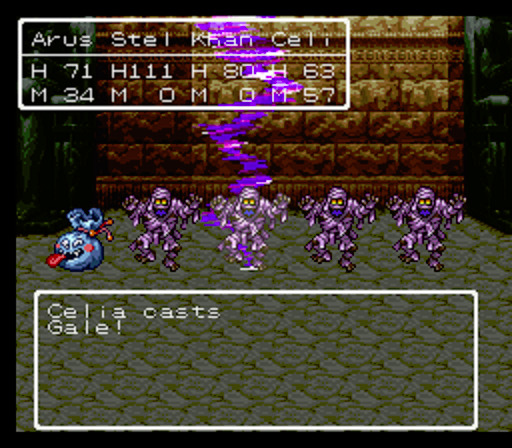
On the surface, it’s still not much more of a plot than the first two games, and for the most part, that is true, but it’s still much more interesting simply because there’s much more going on. Many of the towns you visit are facing some sort of crisis, or have some sort of interesting circumstances around them, such as the immigrant town that slowly changes and expands as the game goes on, making them a lot more fun to discover and explore compared to the towns of the first two games. Additionally, there’s the famous and influential late game twist that strikes after defeating Baramos, namely the reveal of Zoma, Baramos’ superior, and the second world map of Alefgard, the setting of the first Dragon Quest. These two twists are a large part of what made Dragon Quest III so impactful when it came out in 1988, and considering the game presents itself as unrelated to the previous games, and that by the time you defeat Baramos, you’ll have explored the entire world, barring two small locations at most, they hold up fairly well even today. There’s not much more for me to add besides this, however, so it’s time to hop straight to the gameplay.
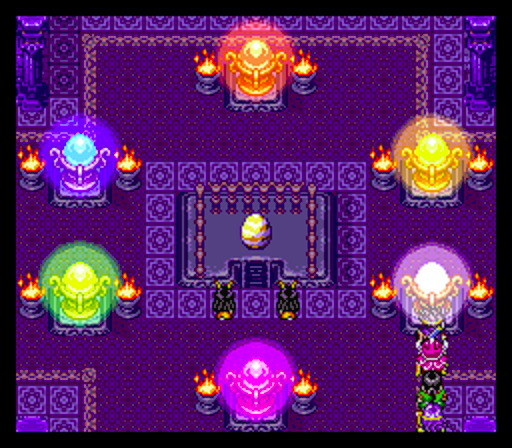
Gameplay:
Dragon Quest III uses the same turn based battle system as the first two games, and besides things like new types of spells and weapons, not too much is changed with the combat itself. The biggest change DQ3 provides is to the party progression system. Instead of the Hero being completely alone like the first game, or gaining two fixed party members in the second, DQ3 allows you to build a party from the ground up, besides the Hero, who’s always required to be in the party, and has the exclusive Hero class, with well balanced stats and unique and useful spells. The party size has been increased to four at a time, and party members can be created and exchanged in Aliahan, with a total of 8 different classes they can be: warriors, slow, yet well equipped physical fighters that act has tanks and heavy hitters, priests, who specialize in healing and support spells and, contrary to most healers in RPGs, actually have decent equipment and offensive options, mages, typical magic attackers with great offensive spells, yet bad physical stats, martial artists, physical attackers with great agility who forgo most equipment and have a higher chance of landing critical hits, merchants, average at best fighters who have supporting abilities like being able to earn extra gold after battle, gadabouts, odd and clownish characters with bad stats besides luck, and a fixed chance to simply goof off and take random actions instead of doing as commanded, thieves, a class exclusive to the remakes, with great agility and several abilities that mainly help with exploration, and sages, who learn nearly every spell in the game, and have a wide selection of equipment options, yet cannot be put in the party to start.

Compared to Final Fantasy I, which had a similar class based party system, and came out only a few months before DQ3, this system actually has quite a few advancements. Most importantly, you’re never simply stuck with the party you start with. As long as you can make it to Aliahan, you can simply make new characters and swap out whoever you’re currently using. Obviously, doing this too much isn’t very practical, considering new members will be behind on EXP, but not being able to permanently lock yourself into an awful party combination is a big improvement alone. Party members who have reached level 20 can also change classes at Alltrades Abbey, resetting their level to 1, and cutting their stats in half, but keeping any learned abilities, meaning, if you were so inclined, you could make a mage with the physical stats of a warrior, a warrior with the speed of a thief, and so forth. Changing classes like this is also the only way to get sages into the party, and even then, only with the use of a Words of Wisdom book, of which only two exist in the game. This lends itself to a lot of creativity, and while I personally didn’t use this mechanic much, only turning my priest into a sage, it’s still an impressive level of complexity for a game this old.
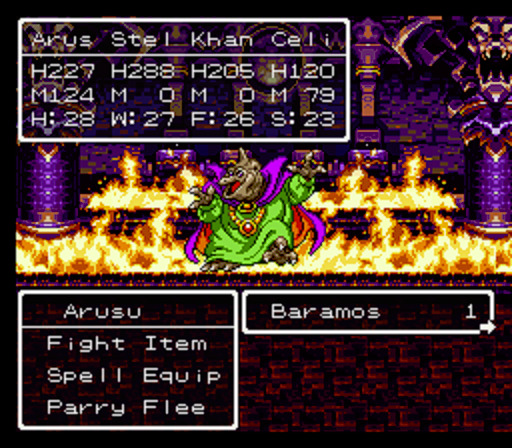
The class balance is also fairly interesting, as beyond the upsides and downsides already listed, classes also level at different rates. Warriors are expensive to equip and very slow, but level the fastest out of the main offensive classes. Martial artists are, by contrast, very cheap, but have the third slowest leveling rate in the game, and the little equipment they do have is usually pretty difficult to get, especially their weapons. Merchants are guaranteed to eventually fall behind if you try to use them, but actually have quite a bit of exclusive, and good, equipment early on, and level the fastest out of everyone. Gadabouts are liabilities, but level second fastest, and can become sages for free once they reach level 20, making them an investment class. Despite how several classes are very obviously inferior in the long run, you actually can get away with some pretty unorthodox party combinations, at least earlier on. Take my party of hero, warrior, martial artist, and priest: very strong physically, but expensive to upkeep, despite the martial artist somewhat balancing it out, and lacking in offensive magic. While switching the priest to sage later on mostly fixed the latter issue, I was still left wishing I had taken a mage with me from the start several times, and yet I was still more than capable of finishing the game. While the difficulty has definitely been lowered compared to the first two games, that’s still a sign of ultimately successful balancing.

For some more combat related changes and improvements, some stats have been added or changed since the first two games. Resilience now determines how many hit points a character can gain when leveling up along with being added to physical defense as before, Wisdom determines a character’s potential magic points, as well as how soon they learn spells, with spells being delayed or expedited by up to three levels, and Luck determines how well a character can avoid debuffs and status ailments inflicted by monsters. Related to these stats, exclusive to the remakes is the personality system, which affects the stat growth of each character, with each party member gaining a personality during character creation or, in the case of the Hero, through a personality quiz given at the start of the game. While this generally doesn’t matter too much for casual play, assuming you aren’t unlucky enough to get the worst personalities on all your party members, it still adds an even greater deal of complexity, either allowing you to try to compensate for a character’s weaknesses, or add to their strengths. You could, for example, give a female warrior the Amazon personality, raising their strength growth, but lowering their agility, wisdom, and luck growth, stats they don’t care about much anyway. You can also change personalities during the course of the game, either temporarily by equipping certain accessories, or permanently by reading certain books scattered throughout the game, which further adds to the depth. It’s a bit overwhelming, but still pretty interesting to see.

Beyond the combat and classes, there’s still a lot of nice things to see. The bag from DQ6, which can hold an unlimited amount of items which can be taken out at any time, has been added, allowing easy inventory management on the spot. The Zoom spell now lets you return to towns of your choice, rather than the last place you saved your game, and while not every town can be warped to, it’s still a massive time saver. There’s a day night cycle, which gradually changes when traversing the world map and affects the state of the towns, and while it isn’t super prominent, there are a few towns pretty heavily affected by it, and you actually get a few ways to manipulate it later on. There’s also a few minigames added, once again exclusive to the remakes, those being the monster arena, where you can bet on computer controlled monster fights for the chance of winning money, and Treasures n' Trapdoors, which is basically a giant board game one of your party members can traverse, with several very valuable prizes available, both from winning and from landing on certain spots on the boards. Despite being very luck based, it’s creative and rewarding enough that the boards are actually a lot of fun to play, and the Switch version lacking this minigame entirely is a big shame. The remakes also added the Cloudsgate Citadel, a bonus dungeon accessible after defeating the final boss, with a superboss, Xenlon, waiting at the end. Defeating Xenlon within a certain number of turns allows you one wish, such as opening up a new Treasures n’ Trapdoors track, or resurrecting a certain character, and thankfully, you don’t actually need to traverse the entire dungeon again to refight Xenlon for more wishes, as a Zoom location is added only a few rooms away.
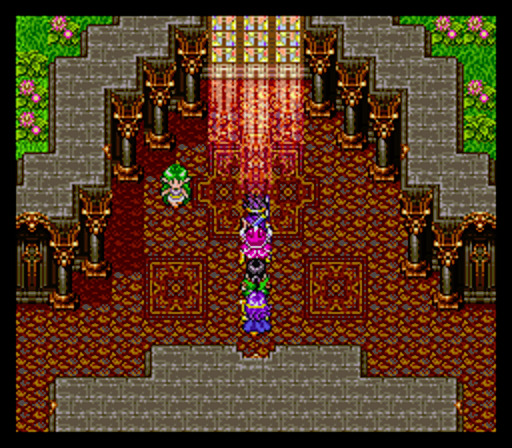
The biggest improvement DQ3 makes, however, is just how well the game flows. There’s still grinding to be found, yes, but generally, the game goes by much faster. Characters move quickly, the difficulty, as mentioned before, is much lowered, so you don’t need to grind 5 levels just to walk a bit north, and there’s just a lot of variety that keeps the game fresh all the way through, instead of becoming monotonous like DQ2. The dungeons are also much more reasonably designed compared to the giant, nightmarish mazes of DQ2, and while you do get a ship like in DQ2, it comes quite a bit later, keeping the amount of areas now available to explore from being as overwhelming. The obligatory key item fetch quest, this time collecting the six orbs to hatch the phoenix Ramia, is also much more reasonable to complete, with the orbs either being in locations that NPCs directly talk about, or being acquired by fighting bosses. Speaking of which, there’s also many more bosses than in previous games, and while they’re not as frequent as in most RPGs, they still add a nice bit of variety, along with actually being pretty challenging, in a good way. Overall, Dragon Quest III’s gameplay actually holds up very well, and just makes it a lot of fun to play. Even considering this is a remake with a lot of quality of life improvements, I was amazed that this was originally an NES game.
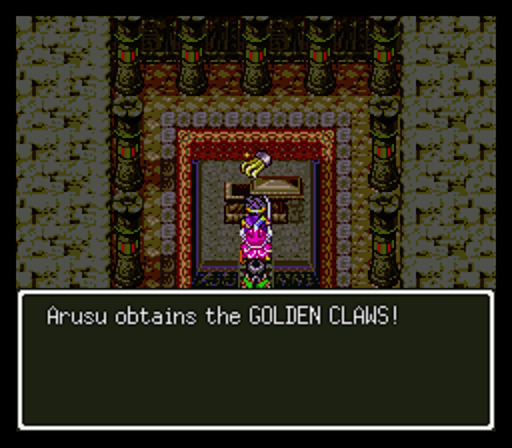
Graphics:
DQ3′s visuals are quite nice, as the SNES version was made with DQ6′s engine. To give a comparison, whereas the games using DQ5′s engine were about comparable to the visuals of Final Fantasy IV and V, the visuals here are comparable to Final Fantasy VI, and considering that’s one of the best looking SNES games out there, that’s a pretty big leap. The character designs come out quite well, and many locations have unique looks to them, both towns and dungeons, with the Pyramid and Baramos’ ghastly castle sticking out the most to me. The enemy battle sprites are still great, and are actually animated whenever they attack, adding a lot of life to them.
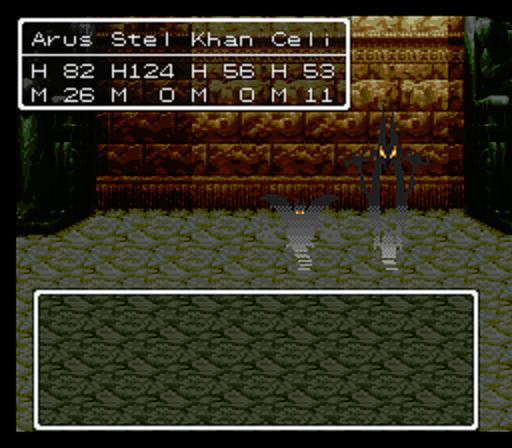

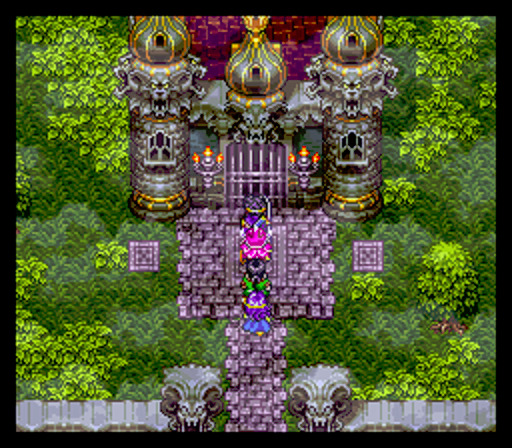
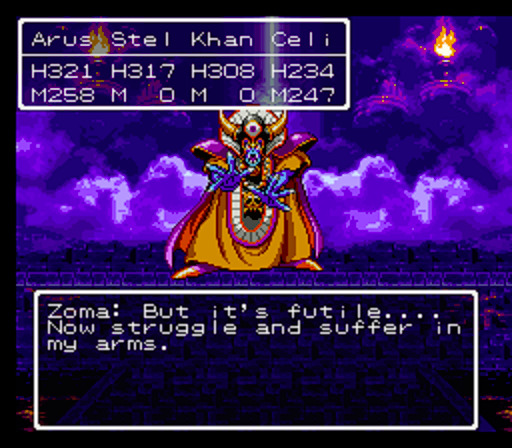
Sound:
As with the rest of the series, DQ3′s soundtrack was done by Koichi Sugiyama, and it’s once again a great soundtrack, even better than the soundtracks of the previous games. From the peaceful Small Shrine, to the iconic Overture, to the peaceful Heavenly Flight, to the world map theme Adventure, to the great final boss theme, Hero’s Challenge, it’s a soundtrack that’s a joy to listen to. It also gives towns different themes for both day and night, which is one of my favorite things to see in games.

Conclusion:
Overall, I would give Dragon Quest III a recommended. It’s aged very, very well, and genuinely feels like it could have been on the SNES to start. Between the much deeper, yet ultimately accessible mechanics that give quite a bit of replay value, to much better overall design gameplay, graphical, and sound design, it makes a fantastic entry point for the series, if you have a liking for classic RPGs. Till next time.
-Scout
5 notes
·
View notes
Text

The beach trope: another one that often comes early in Sonic's quests, and this one's no different, though expectations are very mildly subverted by making it the third zone instead of the very first. (Careful Crusher, you had the audience on the edge of their seats there.)
More importantly though, it's possibly one of the most famous and celebrated level tropes in the series. Emerald Coast is undeniably iconic, Seaside Hill is just as iconic while also merging with the Green Hill setup, and Wave Ocean... is a poor man's Emerald Coast, but it's probably better than most levels in '06 by comparison, so it too is iconic, from a certain point of view. We can't forget Jungle Joyride either, even if that's mostly because we got to see the frame rate die before our very eyes.
So how do you make your interpretation stand out? How do you prevent having a Wave Ocean 2: Wave Oceaner on your hands? Well, it's actually very simple...
Creating Zone 3: Coastline Resort
3-1: Shining Shore
Remember when I said that sometimes all it takes to make an environment feel different is the time of day, or a change in weather? This is one of the first major examples of putting that philosophy into action, as compared to previous beach levels, which were usually content with taking place in the bright sunny daytime, this one takes place under a pleasant purple sunset.


This of course contrasting heavily with not only the blue sea, but also the sands, which although given a mild touch of purple courtesy of the sunset, cannot fully hide their natural shade of white.

And of course, waterfalls.
We can’t forget the waterfalls.

Despite being a true blue beach level first and foremost, there are also a few hints of plaza, further setting it apart from the Emerald Coasts and Not-Emerald Coasts of old times past. This aesthetic in particular is based heavily on the seaside town of Whitby.



No doubt Sonic would admire this place, at least when he's not forced to go deep underwater. Maybe when the adventure is over, he can come back here and have a relaxing moment with... someone. Dunno who though. I doubt Eggman would be interested, and not just because he's actually in-character. Oh well, plenty more horses in the sea.
Speaking of, what about the underwater sections? Shining Shore does have them after all, in full 3D, as opposed to making them bottomless pits in disguise. Unsurprisingly, everything's a lot more blue than purple down there, gorgeously so, but the coral reef provides its own variety of colour.


The local fishies don't seem to mind you being in their line of sight... nor do the Badniks, but probably for a different reason.
Since we're three zones in, you might have noticed by now that each zone, regardless of their overall colour scheme, has one element in at least one act that goes all rainbow with the colours than everything else. You had the flower patches in Gleaming Meadows, you had the wood barriers in Tricky Tropics with their rusting paint jobs, and now we have the coral reef in Coastline Resort... any reason for this?
Alas, the answer is a mundane one: it's just a little way of tying all the zones in Viridonia together. As this quest revolves around the mystery of the elusive Ethereal Zone, this seemingly inconsequential aspect is a way of ensuring that it will always remain at the back of your mind. It may be relatively more subtle and easy to miss than, say, a giant moon glaring down angrily at you no matter where you go on the map as it literally comes closer and closer to killing everyone, but the intention is effectively the same: the central meat of the setting and story is always present in some form, however indirect, even if the characters aren't currently discussing it.
Also, shout out to the lighthouse that helped our heroes by inadvertently blinding the pursuing mechanized orca.

You really put a dent in Heavy Gunner's strategy.
First Section (calm):
Lagoony Tunes (Crash Bandicoot 2: N-Tranced)
Peach Field (Mario Hoops 3-on-3)
Second Section (adrenaline):
Lost Palace (Team Sonic Racing)
Hang Eight (Crash Bandicoot 2: Cortex Strikes Back)
3-2: Crazy Rapids
Being a whimsical water park, made even more whimsical to fit the video game format, this one explains itself in a lot of areas. But let's go over the finer details anyway, shall we?
As mentioned in the fic, the park has been made to fit in seamlessly with the ruins present in the area, thus creating a Good Future-esque wonderland of nature and technology in harmony. For an idea of how the ruins aesthetic would work, imagine something akin to the Sunset Beach Resort in Jamaica, particularly the long bridge and archways you can see in both of these shots:


Kind of has an Aquatic Ruin vibe, doesn’t it?

Even then, that only applies to half of the architecture, as the other half breaks up the yellow with some white, reminiscent of a certain OTHER watery location in Sonic's past...

We also have the giant fountains sprinkled around the place. There are two types of fountains to be exact, both of which may seem familiar to the attentive eye...


The difference? They're larger. MUCH larger. As in, you can actually platform your way on and around them.
As for what’s inside? It's exactly how you'd imagine it to be, albeit exaggerated even further to befit a Sonic level.



And in-tune with the beachside mood, the Chao Garden found nearby would take a page from the one in Station Square...

...with a little extra flavor of this...

...complete with miniature water slides and the like for the adorable inhabitants... the inhabitants that Eggman currently has an unexplained interest in. How do the Chao factor into his latest plan?
Heh heh, only I and those I've discussed it with in PMs know that for now.
First Section (outside):
Windy and Ripply (Sonic Adventure)
Ocean Palace (Sonic Heroes)
Second Section (inside):
Data Select (Tee Lopes)
Wii Shop Channel - Mii Channel (Super Smash Bros. Wii U)
3-3: Aquarium Gallery
Disappointed that Crazy Rapids lacked that smooth red-on-blue contrast that Aquarium Park from Sonic Colours had? Well we can’t all be in the same league as Eggman sadly, but fear not, for the similarly named Aquarium Gallery gets right in on the action, combining red walls and an overall upper class aesthetic...


...with the expected quantities of shimmering blue that comes with the aquarium setting. And with glass tanks of great size, comes great fishies to go along with them.

The black and white checkered floor would also be a must. It's a Sonic game, we gotta have a checkered pattern somewhere. It just works. /ToddCrusher
Don't worry about the living conditions for the fish here, by the way. Eggman mechanizing them aside, the people who work at the park - and those who visit it - make sure to treat all the marine life with the utmost respect and kindness. Just a shame that they're apparently not so willing to lend that same understanding to Trudy... but it does provide an early hint that despite the few genuine bad apples who are outright antagonistic towards Trudy, most of the folks ignorant to her condition are exactly that at worst: ignorant. Meaning, despite first impressions, most of them are not bad people at heart, and with a little help and persistence, it's not entirely impossible that they can eventually learn to understand and sympathise with Trudy's situation.
In other words, they have more dimension than the background characters in Sonic Boom, where they're all mostly a bunch of one-note arseholes with little redeeming qualities and don’t deserve to be saved by Sonic in the slightest.
Anyhow, eventually, after a trip through one of those sweet underwater tunnels...

...we find ourselves in the cavern area, where red is exchanged for turquoise, and there are reflected ripples galore. Since the Marble Caves in Chile already look halfway to being a Sonic level due to its unique formations, that's the best comparison I can make here.

Too blue, you might say? Well, the sunset from earlier would be poking through the holes in the wall, adding some warm to the cool once more... the giant seashells everywhere help spice it up too.

Like these, but bigger than Ken Penders’ ego.
If that’s even possible...
First Section (aquarium):
Rooftop Run - Night (Sonic Unleashed)
Coconut Mall (Mario Kart Wii)
Second Section (caves):
Sea Shell Shenanigans (Crash Bandicoot: The Wrath of Cortex)
Dire, Dire Docks (Super Mario 64)
3-4: Hydro Plant
The outside structure for this place is shaped like a giant wall, which predictably brings the Hoover Dam to mind:

And that applies inside as well, at least initially. The similarities indoors come mostly from the generators, as well as the sheer size of the place.

Since it's considerably rustier however, we have darker lighting in place, with the sunset outside preventing it from being too dark inside. There’s also a copious amount of daring graffiti caused by hoodlums... or maybe Eggman, since he'd probably be the type to do that to any property that isn't his. Some of this graffiti would look very impressive...

While others would... uh...

Look, they tried, okay?
With all this graffiti, that means there’s opportunity for a generous helping of cheeky references to previous installments if you’re able to find them... and if you can understand them. To this day, the typo in “make belif reborn” has not been corrected. Absolutely disgusting.
But as the fic dictates, the further you go on, the tidier and more high tech it becomes. Simply put, this section would remind one of Aquatic Base from '06, mainly because I've always liked the idea despite its characteristically terrible level design, so why not salvage the concept and give it a second chance?

With some added flavor to make it less monotone, mind you. Like actual water sections, some green lights to break up all the blue, giant crab robot threatening to kill you... the works.
Sonic may be glad that this zone is behind him, but little does he know, it's not the only zone with intense water action around these parts. Luckily for him, that won't be for a while, so he can breathe a sigh of relief for now. Still, we know Eggman has other ways of keeping the gang on their toes...
First Section (rusty):
Wily Stage 2 (Mega Man 7)
Pokey Pipes (Donkey Kong Country 3)
Second Section (high tech):
Ocean Base Act 1 (Sonic Advance 3)
H2 Oh No (Crash Bandicoot: The Wrath of Cortex)
15 notes
·
View notes
Note
[ pay ] your muse paying for mine at a store , bar , restaurant , etc . ( you can specify where or for what . )
Scrooge was usually inclined to roll his eyes when Jacob invited him out drinking. He didn’t see the point in wasting money to sit in the company of loud strangers. He couldn’t imagine that he was the target patron for the sorts of places that Jacob liked to visit anyway, based on the stories that he told.
He couldn’t say what quite had persuaded him to join this time. It could have been the slight pleading tone in Jacob’s voice or the soft look in his eyes, or perhaps it was the way that his house always felt a bit emptier when they’d recently parted. But he agreed and the utter glee that lit up Jacob’s face was a reward in and of itself.
As they walked down the street, Scrooge tried to keep pace with his friend, who was chatting animately about the experience they were about to have. Scrooge’s typical inclination was to stride through this part of London as quickly as possible but, as he had already admitted to himself, this was not a day for the usual.
He reminded himself to acknowledge Jacob’s words and nodded as he spoke, though he didn’t quite catch all the names being rattled off. The summer evening glow lit his face perfectly, and Scrooge hoped that his friend didn’t notice the way that he must have been gaping at him.
When they came upon the pub, Jacob opened the door for him and Scrooge found the gesture, small as it was, to be oddly touching. He inclined slightly in a teasing bow but proceeded through, indeed meeting a wall of noise and odor beyond even what he’d expected.
Feeling entirely out of place, he proceeded to the bar and took a seat, cautious of any sticky residue that his hands might encounter. The air was thick and tasted of smoke and sweat and old beer.
“God, Ben, you act like this place will infect you.” Jacob cuffed his shoulder lightly and Scrooge’s chest fluttered.
“It very well might. I’m holding you accountable if I wind up ill.”
“Of course you will. Don’t worry, I’ll be there to hold your hair back if you end up retching.” Scrooge was unfortunately endeared to the thought of him doing just that, minus the retching and he hoped his face didn’t give too much away. The noise level was merciful in that it allowed them to talk freely and that was one clear positive.
“I suppose I’ll trust you to order for me,” he said, noticing that the barkeep was approaching. “Though I hope my trust isn’t misplaced.”
“Has it ever been?” Jacob winked. “Relax.”
“I’ll do my best.” Scrooge leaned back against his chair, against his better judgement.
Jacob plunked down two coins and made the order. Scrooge supposed it only made sense for Jacob to pay, since he’d invited him, but some buried knowledge suggested that Scrooge was meant to get the next round.
“I know it’s a little rowdy in here,” Jacob offered, “but it can be good for clearing your head.”
“I’d imagine you’re right. The din does seem to die off, the more you get used to it.”
Their pints arrived and following a polite clink of steins against each other, Scrooge took a tentative sip. It was rather bitter for his palette, but it went down easy all the same.
“It’s nothing fancy, to be sure,” Jacob, “But it gets the job done.”
Scrooge nodded. That it certainly did, as the warmth flooding his body could attest. Nearly as warm was the hand that suddenly occupied his thigh.
“Are you alright, Ben?” Jacob asked softly. “You’re awfully quiet.”
“Perfectly fine, just taking it all in.” He was telling the truth, for once.
“I know this isn’t really your scene, I didn’t really mean to drag you out. Well, I did, but not if you didn’t want to come.”
“No, no, I did—I do! I suppose I’m just a bit unused to the setting. I do tend to hole up in my cave, as you know.” He rather urgently hated the idea that he’d offended or disappointed Jacob somehow.
“You do, which is why you need to leave it every now and again.” Jacob was still frowning, but seemed more satisfied with that answer.
The crowd at the other end of the bar was starting up a drinking song, and Jacob squeezed his thigh in anticipation. “Do you know this one? I think I remember the words.”
“Yes, it sounds familiar.” Something about sea and ships and love lost. Scrooge had a decent enough voice, and muddled through most of the words, but found himself grinning as their voices met in harmony. He could hardly hear them amongst anyone else, of course, but somehow that didn’t matter. Before long, he found himself raising his mug in cheer along with everyone else, Jacob’s arm resting comfortably across his shoulders.
They burst into comfortable laughter as the song drew to a close, Scrooge lowering his mug to the counter with slightly more force than he intended.
“Careful,” Jacob teased, looking at him fondly. “I don’t want to have to replace it because you don’t know your own strength.”
“Don’t worry, I’ll make it certain that my true power is a mystery to everyone including me,” Scrooge grinned, feeling terribly foolish but it the best possible way.
Jacob squeezed his shoulder gently and before Scrooge knew it, his mug was full again.
“I didn’t realize you could sing like that,” Jacob nudged him. “You’ve been holding out on me.”
“I’m alright.” Scrooge grinned, flush with the compliment. “Sang in the choir for a few years at school.”
“No kidding? Why’d you stop?”
“Lost interest.” Scrooge replied tacitly, as if he’d practiced it. He’d long ago learned how to shut down those memories, lest he risk revealing them—revealing any weakness. “You’re not bad yourself. A benefit of your genteel upbringing?”
“Maybe.” Jacob laughed. “I’m just good like that.”
They enjoyed a comfortable silence as they sipped their pints.
“Thank you for, as you said, dragging me out tonight,” Scrooge offered softly. “Especially since I’ve turned down so many of your invitations before now.”
“I’m glad you came,” Jacob grinned. “I figured I’d crack your shell open eventually.”
“Does that make you an otter?” Scrooge teased, realizing as the words left his lips that they were not as clever as intended. “Prying open my shell?”
“That’s one way of putting it,” Jacob laughed, eyes sparkling. “Finish that up,” he tapped the side of the mug, “the night’s still young.”
Scrooge drained his glass obediently, finding himself much more pliant than usually.
“Sounds like you’ve got plans for me.” The corners of his mouth twitched, teasing another grin.
“Oh yes, devious, devious plans. Come on.”
In the same way he had done all night, Scrooge followed.
“It’s a lovely night, don’t you think?” Jacob asked as they emerged back into the night air, the smell of summer a pleasant shift.
“It is. Perhaps we should enjoy it awhile longer. A nice walk perhaps?”
“You read my mind. Anywhere in particular you’d like to go?”
“I’d be willing to explore. Your selections have been sound so far.”
They had a rather lovely walk through backstreets of London and Saint James’ park, even someone as blase as Scrooge couldn’t deny that the dusk was perfectly suited to it. Cooler, but still light enough to see easily. The sun was setting, painting the sky in all sorts of love purples and oranges, a rather lovely canvas if he was to be honest.
They chatted idly, comfortably; Scrooge remarking on gorgeous carriage horses and stubborn birds near under his feet, Jacob pointing out places he liked to frequent and new businesses in the area. Scrooge found himself paying surprisingly little attention to the particulars of their route, not counting his steps nor the streets.
He found himself doubly surprised, than, that they had stopped in front of a confectionery.
“What are we doing here, Jacob?” He asked, not feeling particularly motivated to combine two different vices today.
“I know you’re categorically opposed to enjoying yourself, but it’s perfect weather for ice cream. Come on, it’ll be my treat.”
Against his increasingly weak objections, Scrooge allowed himself to be led into the shop.
His eyes raked across small mountains of sugar, colorful and lacy like fine dresses. All so excessive and unnecessary and worst of all, expensive. But they did smell wonderful, if a bit overpowering.
“Gosh, Ben, you look like you’re about to start drooling. What looks good to you?” Jacob asked, the shop owner also looking at him inquisitively
“I’ll take the orange blossom, thanks,” he replied, feeling somewhat caught out. Jacob placed his own order and paid before making some commentary on the shop’s other offerings. “I’ve been wanting to come here with you,” he added, as he handed Scrooge the dessert, “and what day could possibly be better?”
“I certainly can’t argue,” Scrooge replied as he took a seat at the mercifully clean-looking table, “I’m glad you thought of it.”
And he was. The ice cream was unfortunately rather delicious and Jacob’s company was always superb.
“Want to try some of mine?” Jacob asked, holding the spoon up to Scrooge’s lips. It was honestly troubling how willing he was to be lead today, but he supposed it was just the way of things. Jacob hadn’t steered him wrong yet. Without hesitation, Scrooge swallowed obediently
“Mmmmm.” If his defenses weren’t already lowered, he’d have been ashamed to make such an undeniable sound of please
“Yes, that’s about what I’d hope to hear,” Jacob replied and Scrooge pinked faintly before offering his friend some of his own.
When they finally emerged from their decadence, the sky had grown much darker, just past dusky. They watched a flight of bats take off as they weaved their way back through the park, Scrooge chancing at holding Jacob’s hand in the inky dark. An effort, he found, that was returned enthusiastically.
Before long—far too soon, in fact—they were outside Scrooge’s door and he felt a sudden ache of disappointment. Childish for sure, the stubborn urge to not let the fun end.
“Thank you for a lovely evening,” Scrooge began, and in the safety of his dark street not yet lit by gas-lamps, he felt Jacob’s lips pushing urgently against his own. Full and soft and heavenly as they had been every time before, but now somehow more tender. More gentle. Perhaps that was simply Scrooge’s own fancy. He fumbled to return the kiss, feeling an unpleasant surge of neediness when Jacob finally pulled away.
“Goodnight, Ebenezer,” He nodded with a smirk in his voice, leaving Scrooge with one hand loosely on his doorknob and the taste of sweetness on his lips.
#shacklespectre#this got a bit long#the only way to do nice things for scrooge is to trick him into it
5 notes
·
View notes
Text
Schadenfreude
Go ahead, laugh.
Roger Stone's indictment and arrest were a long time coming. Donald Trump's shutdown face plant only felt like, especially if you were "furloughed" or, worse, working for Trump for free. It couldn't have happened to two nicer guys.
The story of Stone's arrest was the latest "devastating news" for Trump, outdone perhaps only by Trump's self-own hours later. Given the amount of suffering both men have caused and celebrated in their careers, and especially in the past two years, it really is easy for a majority of Americans to feel good about either of them feeling bad.
The elation at seeing someone who has gained from hurting others brought low may only be topped by the anticipation of seeing someone who has "gotten away with it" for so long finally about to be caught and punished. You're damned right, we feel good.
And yet, that feeling should concern us. We should be wary of enjoying the suffering of others. That it seems to be hard-wired into us is no excuse.
To enjoy something to the point of being driven by its pursuit has never not led a culture to disaster. We want it, then we want it now, then we want it to the exclusion of all other things. We reach a point at which we can no longer imagine our world without it. We hunger for it and will not accept anything less, and woe be to anyone who dares get in the way of that.
This is fanaticism. It's different than rooting against a hated sports team, or celebrating a bit of karma come to the sorest of sore winners. It isn't choosing a team and enduring losing season after losing season as a member of a tribe, building an identity and a bond with others through that loss.
No, this is cheering for the arrest or murder of a political opponent, or of a journalist or public figure who dared to criticize your side. This is excusing atrocities you would normally condemn but instead defend because they were committed by those you need to get what you want.
Those hypocrisies we like to point out in political opponents, when they criticize behavior one day then embrace it the second they win power, or lose it, how are they phrased? On what platform are those ideas and freshly twisted ideals presented?
The politicians know they're contradicting themselves. They know, on some level, that we know, too. And yet, they go on, pushing us to extremes, asking us to choose to enjoy the suffering of others, the "losers", as we win.
Take the episode of the Catholic schoolboys facing off against the Native Americans. "Episode" seems like the right word. So much of the coverage felt selective and directed. For a few days, the main video, the one of the boy seeming to smirk as the man chanted in front of him, did provide something of a Rorschach test for Americans. We all felt comfortable deciding who was the aggressor, and we were all right.
At the end - can we call it an "end"? - the media and the public got so caught up in absolutes that the proven failure of one meme, that the boys chanted "Build The Wall", was used to discredit criticism of everything else they did, from wearing MAGA hats while confronting Native Americans to many of them mock chanting while they did a group tomahawk chop. Yes, folks, that was very racist and it was caught on video.
Our fear of others, which could have lessened as a result of confronting our own capacity for cruelty, was instead twisted and exploited, as the boys and their families complained of harassment, including death threats, from leftists and other MAGA hat haters.
So, we're back at fear and offered a choice of extremes. The entire narrative of immigrants threatening the southern border has followed this. It was designed to follow this. At its root is rooting for others to suffer, for seeing others, others not like us, fail. Their tribe, not ours. They lose, we win.
The shame of it is, we should feel good about Roger Stone's arrest and what was revealed in his indictment. It gets us closer to understanding how our electoral system was and continues to be corrupted. It points us, yet again, to recognizing that corruption is about money, not ideology.
Which brings us back to Trump and his month long temper tantrum. Seeing him fail actually means very little. For one thing, two years of failure haven't made much of a dent in his polling numbers. For another, we have only a three week reprieve before the government again faces being shut down.
Federal workers hurt by the 35 day shutdown have no guarantees. Right now, most of them are busy trying to undo damage done by their forced absences. The damage done is greater than it may seem. On the surface, we all saw TSA and IRS workers suffer, and national parks filling with garbage, but the damage done to regulatory agencies could have been even worse.
What happens to the environment when there are no EPA agents in the field? What happens to the food supply without the FDA? Concerned about border security, are you? Who's inspecting shipping containers at our ports in a shutdown? How many resources are directed to any of those things when the government is open? Who do we need protection from? Exactly.
The right wing may love it when government doesn't work - that is, ultimately, what the right wingers in Congress and the White House (and their financial backers) have been pushing for all along - but competent government benefits them just as well as anyone, and even if they won't admit that, their polling numbers made it clear. That's why Trump caved. That and that alone.
If they stay down that far or near it, the Republican Party will lose in 2020, enough that the Democrats will regain the Senate and the presidency. There will be cheering. There will be dancing in the streets. There will be a flood of social media posts by those calling themselves winners on how much they hope the losers are suffering.
And then we'll all have to clean up, because the damage done by destroying a government's ability to function is enormous and expensive. We can only hope we have found enough common ground to see it through for the benefit of all and not just our side. If we fail, if we let government fail, the damage done these past two years will be nothing.
Worst case, with the return of regulation and oversight threatening to eat into corporate profits and the undoing of the Republicans' 2017 tax cuts for the wealthy, we'll see a rush to remove money from where a federal government with teeth can find it. We'll see economic bubbles propped up by loose money start to collapse, one by one, each initiating the next, until our economy and any economy tied to ours suffers in ways we have not seen in almost a century.
That could really happen. It has before, and for the same reasons.
Go ahead, laugh.
- Daniel Ward
#schadenfreude#fyre festival#politics#fanaticism#accountability#government#government shutdown#small government#regulation#right wing#economics#donald trump#nancy pelosi#mitch mcconnell#2017 tax cuts#pawel adamowicz#poland#roger stone#corruption#wikileaks#covington#nathan phillips#racism#native americans#robert mueller#russia#oligarghs#organized crime#new england patriots#new orleans saints
0 notes
Text
50 Tracks 2019
Welcome!! This is your annual installment of 50 Tracks, the musical greeting card to all of my favorite people both near and far. I hope that you and yours have been enjoying the holiday season, the brightness of the lights in the cold of winter, and the warm comforts of steady tradition. May you carry this joy into the boundless opportunity of the new year!
2019 was similar to its predecessor in that it was short on truly great music but deep in really good music, though I think there was actually more depth in album quality this year than last. As I say every year, music continues to be a mirror for where we are individually and as a world, so it’s no surprise that many of the artists I chose to select here are echoing the dynamics I find myself exploring in the twilight of 2019: feelings of uncertainty, existential dread, hedonistic joy, comic apathy, anger and catharsis, obstacles of love, wavering currents of hope. As I age I recognize more and more the way that music can act as a prism through which my emotional thought is refracted and colored, and I am both unsettled by the distorting impact that may have on my perspective, as well as being in awe of the tidal force that it plays in my understanding of the world around me. I hope at least one of these songs or artists can have that level of impact on you as well.
As always, the list is limited to one entry per artist. It was frequently challenging to choose one song to represent the impact that many of these cohesive albums had on me this year, so when the featured artist had multiple songs that were among my favorites of the year, those additional songs will be denoted below the main entry in [Brackets]. Click on the bolded song titles to open the accompanying YouTube video. Enjoy!
Honorable Mentions:
Chromatics - Closer To Grey
We’ll start things off with the washed out driving electronics of Portland quartet Chromatics, who dropped a surprise seventh album in October, also titled Closer to Grey. Always good to set a mood, Johnny Jewel and company deliver another gem here, perfectly scoring my snowed-out back road wanderings this winter.
Clams Casino - Rune
Now almost 10 years into a career that has already seen a remarkable amount of both commercial and critical high notes, New Jersey producer Clams Casino continues to be central in forming hip hop’s next waves. Returning with only his second proper studio album, November's Moon Trip Radio was another dive into his ambient side, ripe with both churning anthems like Rune and delicate moments that feel like watching butterflies flutter about in the sun.
[Twilit]
Crumb - Fall Down
Crumb is a wonderful indie-psych quartet of Brooklyn-based musicians who formed while attending Tufts University right in my backyard. The band quickly received some strong buzz with 2017’s Locket, and followed that up with their first full-length project Jinx this June. That record is stocked with fuzzy little tunnels of sound, with Fall Down being my personal favorite.
JPEGMAFIA - Jesus Forgive Me, I Am A Thot
I've been aware of the artist affectionately known as Peggy for the last couple of years, and while I didn't see last year's Veteran as the achievement some felt it was, I definitely respect the creativity, individuality, and force of the man as an artist. With the attitude of a punkster, a sample folder of the Gods, and a sound born in the deepest cockles of the internet, one of JPEGMafia’s greatest strengths is just how much he attacks you with his musical vision. It’s never worked as well as it does here on the whip-tight energy of Jesus Forgive Me I Am A Thot.
Mannequin Pussy - Drunk II
I'm not even going to try to defend this band name, it's one of the worst I've ever come across. That said, the Philly foursome are proving three albums into their young career that their music can be just as affecting, with lead singer Marisa Dabice delivering a powerhouse turn here with her desperate musings on Drunk II.
Mariah The Scientist - Beetlejuice
I still know very little about Atlanta R&B singer Mariah The Scientist, and the lack of overall noise about the 21 year-old fits with the somewhat strangely elusive feel of Beetlejuice off her August debut Master. On the one hand her age, the look of this video, and her connection to Tory Lanez paint the picture of an R&B B-level flash. And yet the measured power in her voice here, the patience of the production (those drums wait until 1:40 to kick in), and the way her jaded lyrics feel decidedly genuine all point towards a much more promising young artist.
Sir - Mood (ft. Zacari)
A stand out from Inglewoed singer and TDE artist Sir’s latest Chasing Summer, Mood is the well-balanced poolside cocktail for your taste buds. Here the hook comes from label-mate Zacari, who provided a similar garnish for Kendrick on 2017’s Love, and had his own song in contention with Don’t Trip from back in the spring.
Smino - Klink
It feels like Smino’s hip-hop sensibilities are all very relevant to the collective sound in 2020, which might be part of the reason (writing killer hooks always helps) the St. Louis rapper is as well-connected in the community as he is. With ties to Dreamville and everyone in the Chicago scene, Smino blends influences like Nelly, Outkast, Ludacris, and Bone Thugs with his own cartoon flow to create something unique on every feature. I’m stoked to see him and 50 Track alums No Name and Saba join up for more music together as Ghetto Sage in 2020.
Spirit Family Reunion - Come Our Way
Spirit Family Reunion gave us another fulfilling entry into their version of the American Songbook this year with August's Ride Free, the Brooklyn band’s third stellar LP of traditional folk/bluegrass/gospel music. This album saw Nick Panken and friends share a little more of themselves and their view on the state of the world in 2019, with some of that slow entropy leaking into the easy country road malaise of Come Our Way.
Zsela - Noise
Zsela is 24-year old Zsela Thompson, half-sister of actress Tessa Thompson and currently unknown darling of the music/fashion world, releasing hauntingly composed folk ballads and then playing sets on runways, in moody bars, and in quiet churches. Both Noise and Earlier Days made a strong impression on me this year, and if Thompson can approach the heights of current tour mates like Cat Power and Angel Olsen, she’ll be doing just fine.
[Earlier Days]
50.) 03 Greedo & Kenny Beats - Disco Shit (ft. Freddie Gibbs)
03 Greedo hasn't necessarily done much to make me take notice to this point, but as a fan of Kenny Beats (check out his YouTube show The Cave if you haven't) I gave their collaborative album Netflix & Deal a listen, and while this is one of the lone standouts, Greedo might deliver the hook of the year right here. The way his voice hits this beat is butter, and with the bonus of hearing an auto-tuned Gibbs, this one is too good to deny.
49.) Girlpool - What Chaos Is Imaginary
LA duo Girlpool have graced this list a couple of times before, but February's What Chaos Is Imaginary was the first record they've released an album since founding member Avery Tucker's voice became profoundly impacted by hormone therapy. Tucker entered the gender flow in 2017 and has had to cope with the impact that flow has had on his voice, once a huge part of the band’s sonic identity The title track of that record is proof enough of the band’s resilience, with Harmony Tividad’s voice wielding much of that restorative power.
48.) Rich Brian - Yellow (ft. Bekon)
After being somewhat of a meme throw-in in this area of the list with his song Dat Stick (as Rich Chigga) back in 2016, Brian Emmanuel has steadily become a legitimate artist in hip hop, following up 2018’s solid Amen with The Sailor this July. Lead single Yellow is a creative revelation for Brian, introducing a wave of psych elements, the prominence of his singing voice in new ways, and a more direct window into his pain.
47.) Sacred Paws - The Conversation
Indie rock duo Sacred Paws won the Scottish Album of the Year Award with their 2017 debut Strike A Match, and returned with more noodly goodness with May’s Run Around The Sun. The Conversation was just one of a number of tracks on that record with a similar 90s sunshine sensibility that feels so blissfully hopeful and welcome in this era of existentialism in music.
[Almost It] [Brush Your Hair]
46.) Danny Brown - Dirty Laundry
With uknowwhatimsayin, his first record in the shadow of 2016’s Atrocity Exhbition, Danny Brown says his goal was to create a hodge-podge of sounds and ideas, like how when people tack ‘you know what I’m saying?’ to the end of heir sentences they’re usually not saying much. The record comes off sounding much more New York than Detroit, but Danny keeps his manic energy, hitting his spots with a range of humor, wit, and tenacity over Q-Tip led production.
[Best Life] [Change Up] [Combat] [Savage Nomad]
45.) Boy Scouts - All Right
Boy Scouts is Oakland singer-songwriter and multi-instrumentalist Taylor Vick, and her record Free Company made it across my desk relatively late in this process, as her stellar track Get Well Soon graced some other end-of-the-year lists. But it was the chugging blues and golden refrain of All Right, complete with space confetti synths, that really permeated my being. One of those relatively soft songs you can still head bang to.
[Get Well Soon]
44.) Brockhampton - Dearly Departed
Ginger was a step forward for the boys of Brockhampton, even if it failed to reach the same dizzying heights of any of the Saturation trilogy. Still trying to find their footing in the wake of traumatic transition, BH have oscillated between an R&B sound (giving Bearface and Joba more reps and streamlining production) and a gritty oddball sound (more bombastic Romil production with Matt, Meryln, KA, and Dom front and center). Dearly Departed is the emotional centerpiece of Ginger and sees the group confronting the anger and pain that Ameer’s absence has left them with.
[Sugar] [If You Pray Right]
43.) Oso Leone - Virtual U
Virtual U is a sticky ode to modern distance from Barelona-based band Oso Leone, who broke a 5 year fast with their third record Gallery Love back in March. Striking a similar tone as modern bedroom bands like Rhye, with influences from the world of jazz, fusion, and 90’s pop, this one ripples with a meditative swagger.
42.) Pivot Gang - No Vest (ft. Mick Jenkins)
2019 was the year where we finally got a handful of “Crew” records from some of the most vibrant gangs in hip-hop (with Travis’ Jack Boys project only releasing in the days before this was published), and the three big ones all made the list. First up is Pivot Gang, the west-side Chicago clique who have been putting out diverse independent hip-hop for the past ten years. The group lives on without founding member John Walt, who was memorialized in group leader Saba’s tour de force Prom/King from last year. Their first studio album You Can’t Sit With Us is littered with standouts, but here’s the Mick Jenkins featured No Vest, where you get to see all three core members turn a verse.
[Bible] [Mortal Kombat] [Hero]
41.) Kanye West - Follow God
It’s a strange time to be a Kanye fan on the eve of 2020. While he’s (thankfully) not following through on his promise to run for president this coming year, Kanye has continued to thrust himself into the social/political consciousness in recent years, and in increasingly destructive ways. I’ve always been a Kanye defender, partly because I understand the bond bond between art and artist to be inherently tumultuous, and because I’ve seen Kanye as an impulsive, narcissistic, and emotional, but ultimately harmless musical savant, who consistently reinvents himself and pushes genre forward. I thought The Life of Pablo was a flawed masterpiece, and furthered the notion of Kanye as a towering artist, both in reality and inside of his head. His decision to scrap Yandhi and replace it with Jesus is King will become one of the more bizarre ‘what ifs?’ in hip-hop history, and the combination of his pseudo-religiosity and Trumpathy (just made that up) are signs of a man cracking under the weight of his own ‘icon’ obsession. To Kanye, Trump represents the pinnacle of ego achievement, I don’t think he so much endorses the politics as much as he is blinded by the raw power of Trump’s being. As documented in the Jesus is King videos, Kanye is building a rural kingdom in Wyoming, Kardashian clan fully in tow, his personal brand of middle-age dad paranoia melding with the existential paranoia sitting heavy in the 2019 air. But even with all of the baggage he brings these days, Kanye can still make remarkable music. Even at 1:45 Follow God is the standout moment from JiK, but if you want an indication of what the record may have sounded like in the Yandhi alternate timeline, and what this man is still capable of, check out the OG version of Selah linked below or revel in the power of Use This Gospel’s solo (whether you prefer Mike Dean or Kenny G).
[Original Selah] [Use This Gospel]
40.) Gerry Read - It’ll All Be Over (DJ Koze Remix)
This is the second straight year that DJ Koze has made a loop-heavy dance floor smash that begs for repeat plays. Last year it was his Gladys Knight sampling shake of Pick Up and this year it was his re-work of his label signee Gerry Read’s equally groovy It’ll All Be Over that nustled into a warm place in my subconscious.
39.) Dreamville - Costa Rica
Here’s the second crew record to make the list, with the exuberant Costa Rica from Dreamville’s third Revenge of the Dreamers compilation. The last installment of this series was all the way back in 2015 however, and even though label-head J. Cole remains the leader of Dreamville, III is a different monster purely in scale. With a swollen features list, swollen track list, and a stable of new talent since 2015 that includes J.I.D and Earthgang, III is groundbreaking in its consistency and it’s commercial appeal. Alongside posse cuts and introspective bangers, Costa Rica is notable in that it jams 9 artists into three and a half minutes and none of them are named J. Cole.
[Wells Fargo] [Sacrifices]
38.) Joji - Sanctuary
Another memer gone good, Joji made this list for the first time last year with the understated sleeper Test Drive but in 2020 he left twitch subtlety behind for the quiet grandeur of Sanctuary. Appropriately laid over the backdrop of space opera and ruminating on the soul’s solace in love’s intimacy, Sanctuary is a stunning 180 for the man formerly known as Filthy Frank.
37.) Kevin Abstract - Joyride
It’s easy to feel like Brockhampton have been taking their sweet time with their music over the past two years, but the you remember that’s only because they put out three classics in 2017 alone, and then you realize that Kevin Abstact’s Arizona Baby is basically a BH companion record, and they probably scrapped at least two albums worth of music post-Saturation, and you realize the sheer pace these boys are moving at. I personally felt Arizona Baby was a better record pound-for-pound than Ginger, and I think a lot of that is because Romil’s production really shines through, with the horns and atmosphere of Joyride being a great example.
[Baby Boy] [Georgia]
36.) Tame Impala - Borderline
I'm not sure whether or not Kevin Parker is feeling the weight of expectation, but the uncertainty in the rollout for his fourth studio album (appropriately titled The Slow Rush and now scheduled for February) has been interesting to watch. It’s not like an artist of Parker’s caliber to cave under public reception, but it seems like that’s ultimately what happened as he chose to delay the album after playing SNL and initially releasing two singles from the project back in April. While the lead single Patience did feel a bit uninspired, the salt-breeze pop of companion Borderline has been in rotation ever since.
35.) Earthgang - Proud Of U (ft. Young Thug)
It was hard to pick an Earthgang track largely because it’s always hard to pick a Young Thug track. I could have just as easily used this as his entry as well (more from him later), but Thugger and Earthgang deserve their own spot this year, with the latter releasing their major label debut with September’s Mirrorland, a refraction of their vibrant funk-rap. While it may not be the best showcase of the style of Atlanta duo Johnny Venus & Doctur Dot, Proud of U was undeniable this year. More samplings from Mirrorland are linked below, and Venus is featured prominently on Dreamville’s terrific Sacrifices.
[Bank] [This Side] [Top Down]
34.) Florist - Time is a Dark Feeling
Florist graced the list back in 2017 with the serene reflections of What I Wanted to Hold, a collection of polaroids, winter scenes through cold kitchen windows, dreams of warmth. They’ve done it again this year with Time is a Dark Feeling, a contemplation of the void out ahead of us, and the way it clings to your bones with a hollow chill.
33.) Freddie Gibbs & Madlib - Crime Pays
5 years after Pinata, the initial studio collaboration of Gary Indiana heavy hitter Freddie Gibbs and legendary producer Madlib, the duo returned for the highly anticipated follow-up Bandana in June. Freddie has been a favorite of mine the past several years and the flow is extra nice over Madlib production, like on the twinkle-laced ‘making it’ anthem Crime Pays. Freddie and Danny Brown both share a love of Midwest disco style, and use their videos to play characters, act goofy, and explore their aesthetic.
[Half Manne Half Cocaine] [Palmolive]
32.) Grace Ives - Mirror
This DIY pop number feels like it just shook itself into existence. It certainly shook itself into my brain this year, and to watch Brooklyn musician Grace Ives perform it, with sudden barks and stops and starts, it feels like it shakes her pretty good too.
31.) Maxo Kream - Meet Again
With his second studio album Brandon Banks Houston MC Maxo Kream shows off one of the best voice/flow combinations in the game, as well as a growing storytelling ability, both on full display here on Meet Again. Maxo uses prison correspondence to paint a picture of his life’s traumas: how money, drugs, and the judicial system have systematically destroyed those around him. You’re left almost as amazed at the story as you the skill with which he tells it.
[Change] [8 Figures]
30.) Daughter Of Swords - Dawnbreaker
Man, the delicacy of this song is so wonderful. Daughter of Swords is the solo venture from former Mountain Man member Alexandra Sauser-Monnig, and the tenderness she crafts both in her finger picking and in the gentle lilt of her voice is so striking that Dawnbreaker is demanding of your attention on every play.
29.) Young Thug - What’s The Move (ft. Lil Uzi Vert)
I told you that it’s hard to pick just one Thugger song. His best albums (So Much Fun is a good one) sort of flow into each other both in sound and in quality, so that every beat, ad-lib, and vocal cadence hits like a familiar friend, with no one song standing out. You’re not a fan of just one Thugger song, you’re a fan of the whole Thugger experience.
[Surf] [Light It Up] [Ecstasy] [Circle Of Bosses]
28.) Bedouine - Bird
I was just going on about how the tenderness of Daughter of Swords felt so strikingly apart, but Azniv Korkejian (who records as Bedouine) specializes in those tender songs that grab you by the collar and hold you close. The Syrian-American singer-songwriter recollects titans like Joni Mitchell and Leonard Cohen, as well as contemporaries like Jessica Pratt and Tobias Jesso Jr., and Bird is an entry equal to those masters.
27.) ScHoolboy Q - Numb Numb Juice
Even though CrasH Talk was something of a flop for TDE stalwart ScHoolboy Q, he still managed to produce one of the best pure rap songs of the year with dizzying lead single Numb Numb Juice. Packed with raw attitude along with memorable lines and cadences, it’s a song that feels a lot longer that its two minute run time and has crazy replay value.
26.) Davido - Disturbance
For those like me whose knowledge of world music trends is limited, you should know that Afrobeat (and more specifically Naija-beat from Nigeria) is having a moment right now. With so much similarity to the more melody-driven hip-hop sound that’s so prevalent stateside, and the role the Toronto cliques have already had in incorporating island sounds to the masses the past few years, it makes sense that modern Afrobeat would have so much crossover appeal. There’s a lot of artists primed to take advantage of that wave, but most agree that Davido is the current living legend of Afrobeat, and with perfect little songs like Disturbance from A Good Time, it’s easy to see why.
25.) Angel Olsen - All Mirrors
Perhaps one of the current living legends of alternative music, St. Louis native Angel Olsen first graced this list all the way back in 2014 with the sorrowful May As Well. Things have changed a lot in the past 5 years, with Olsen eventually evolving to a much more expansive, almost gothically theatrical sound throughout the crest that was her 2019 album All Mirrors. The title track, along with the soaring Lark, are the best offerings.
[Lark]
24.) Toro y Moi - Who I Am
Who I Am is off of Toro Y Moi’s terrific electronic/dance record Outer Peace from early January, whose lead single Freelance was one of my favorite songs from 2018, clocking in at #14 on last years’s list. The rest of the record was equally strong, especially in Chaz’ ability to craft minimalistic chill electronica that still gets stuck in your head. Most of those more laid back tracks are those below, because Who I Am is another upbeat party song in the same throbbing vein of Freelance.
[New House] [Baby Drive it Down] [Monte Carlo]
23.) Nilufer Yanya - Melt
I had thought this may be the third time on the list for the low-key London songbird Nilufer Yanya, but in checking the record I’m reminded that she just put out a bunch worthy of inclusion back in 2017 when I first caught wind of her, starting with Golden Cage and culminating with Baby Luv. Returning this year with March’s Miss Universe Yanya gives us another strong collection to choose from. I’m partial to the jazz-club sound of Melt, but you can’t go wrong with these other three either.
[Heat Rises] [Tears] [Safety Net]
22.) Denzel Curry - Ricky
One of the more consistent and unique young voices in hip-hop, Dade county’s Denzel Curry has been on the map for over 6 years despite not being 25 yet. Starting with 2013′s cloud rap classic Nostalgic 64 (released while Zel was in high school) and graduating to critical emo-rap darling with last year’s Ta13oo, Curry decided to just hit us with some straight bangers in 2019 with Zuu.
[Carolmart] [Speedboat] [Wish]
21.) FKA Twigs - sad day
The bulk of Magdelene (co-produced by 50 Track alum Nicolas Jaar) may not be the kind of music that I’m dying to listen to again and again, but I can’t deny the artistic plane that FKA Twigs (also an alum with 2014′s Two Weeks) is operating on throughout the record inspired by her tabloid breakup with actor Robert Pattinson. Tracks and videos like Cellophane are a remarkable testament to Twig’s raw emotive power (like bright liquid flowing from a freshly cracked melon), but it was the melodic flutterings and glitchy atmosphere of sad day that got lodged in my brain.
[Cellophane]
20.) (Sandy) Alex G - Gretel
This song, from Philadelphia indie artist Alex G, bounced around a lot throughout the process of this list, from the cutting room floor to the honorable mentions and ultimately all the way up to kicking off the top 20. Gretel might sound somewhat inauspicious at first, but there’s a lot to unpack here, and it benefited from being in rotation since the summer, making it a Maine-house stargazing staple. With elements of acts like Elliot Smith, Broken Social Scene, and even the late Lil Peep, Giannascoli has carved a beautiful little space between genre.
19.) Frank Ocean - In My Room
Mostly in hibernation since the dual releases of Endless and Blonde back in 2016, Frank Ocean slowly begun sticking his head out of the cave in late 2020 with a trail of singles from a supposed forthcoming third studio album. Two of the tracks were released across all platforms including the mumbly DHL, and three others (Dear April, Cayendo, Little Demon) that were released as vinyl-exclusive singles. These four songs range from puzzling to promising, but despite the shipping reference Frank really only delivers on the final cut, the dualistic In My Room. On the first half of Room Frank gives one of his more cohesive and well performed rap verses to date, exploring themes of bravado, ambition, and hate, while the second half blossoms into his familiar melodic coos, both halves hopefully a harbinger of things to come in 2020.
18.) Beast Coast - Coast Clear
The third and final crew record on our list is from the collective known as Beast Coast, long an informal tag for the combination of three prominent Brooklyn groups who finally hybridized for a full-length project Escape From New York in 2019. Beast Coast is Pro Era (Joey Bada$$, Kirk Knight, CJ Fly, Nyck Caution, Powers Pleasant, etc), Flatbush Zombies (Meechy Darko, Erick Arc Elliott, Zombie Juice), and The Underachievers (AK The Savior, Issa Gold). All three of those groups have been featured individually on the list before so the hype was definitely real for me, and I was so thankful that Escape turned out so great. Coast Clear was my personal favorite and served as the encore when I saw these guys in August (which was wild), but check out the video for Left Hand if you need a more formal introduction.
[Left Hand] [One More Round] [Bones]
17.) Aldous Harding - The Barrel
Aldous Harding hails from Lyttelton NZ, a small town near Christchurch that lies on the same peninsula where I would often take the bus to have a day at the beach. The Barrel, a strange little dance/folk number, only found its way to me as I was combing other year-in-review lists this past month making sure I didn’t miss anything, which always makes for trickiness when ranking them among other songs I’ve been listening to for months. But the uniqueness of this track (magnified by the music video), the seamless way the backing vocals are integrated to the latter half of the song, and the Grateful Dead-esque guitar part combined to give me the sense that this one might endure into 2020 and beyond.
16.) Daniel Caesar - Cyanide
Toronto’s Daniel Caesar has been one of my personal favorite R&B artists since I heard his track Death & Taxes back in 2015, his neo-soul/gospel sound culminating with 2017′s terrific Freudian. His second album Case Study 01 out this past June drifted away from that gospel influence and introduced more electronic and island sounds, as exhibited on the effervescence of Cyanide.
[Entropy] [Frontal Lobe Muzik] [Restore The Feeling]
15.) Frankie Cosmos - Rings on a Tree
The evolution of Frankie Cosmos from minute-long journal-entry-style lo-fi bedroom recordings free on Bandcamp to full-band alt princess has been one of my favorite artist trajectories to witness, and she returned with her fourth studio record Close It Quietly this September. Now her fourth appearance on 50 Tracks, Rings on a Tree was featured as a full-band song on that record, but a stripped down piano version that was included on Kline’s Haunted Items EP from March is the version I’m giving you here. A hopeful little yarn about love and death and suicide.
[Actin’ Weird] [41st]
14.) 2 Chainz - Money in the Way
I can’t tell you that I expected a 2 Chainz song to be in the top 15, especially above artists like Frank, Twigs, Angel, and Denzel. I mean what is this, 2011? That my friends is the joyous power of Money in the Way: a triumphant, brass heavy victory lap and one of the most fun rap songs you’ll ever hear. I challenge you to not bop your head with a goofy ass smile to this one.
[NCAA]
13.) SALES - Rainy day Loop (Parent’s House Remix)
SALES may not have put out a record in 2019 (they’re still touring 2018′s forever & ever) but they still managed to get a song on the list, as they released a remix of Rainy Day Loop from that record this past March. Keeping the core melody, but accelerating the pace and swirling in the drum kit, SALES create an entirely new song on the remix, so much so that I didn’t recognize it on first listen. The beat billows and bends through the atmosphere, with lines like ‘watch me fade away’ ‘stuck in a rut’ and ‘watching everything around me come undone’ supplying you with the chillest depressive episode ever.
12.) Tierra Whack - Only Child
Looking back with hindsight on 2018′s list there were at least three major acts I missed. The first was the self-titled album by one of my favorite electronic arts Chrome Sparks (see O, My Perfection), the second we’ll get to in a bit. The third was Philly’s Tierra Whack, who put out one of the most unique, fresh, and ambitious projects I’ve ever heard with 2018′s Whack World, a 15-track album with a run time of less than 16 minutes due to each song being ~1:00 snippets that were deliberately made to sound incomplete but cohesive. She then shot a 16-minute video for the album, which showcases different sounds, flows, characters, and lyrical foci. One of the best things I heard this year by far. She followed Whack World up with some loosies early this year, including Only Child which was promptly stuck in my head for a month. This girl is so god damn creative it blows my mind. But as she says on Wasteland, ‘There’s a long line, there’s a wait.’
[Wasteland]
11.) Tyler, the Creator - A Boy is a Gun
Speaking of fascinating trajectories to witness, who would have seen IGOR coming from Tyler back in the early OF days? Taking his patented in-your-face persona, applying it to his newly open queerness, and splashed against a canvas of neo-soul maturity, heavenly samples, and his trusty voice mods, Tyler put out one of the more complete and personally meaningful albums of 2019, like a vicious snake shedding his beautiful skin.
[Earfquake]
10.) Jai Paul - He
One of the most influential artists of the past ten years that you’ve probably never heard of, Jai Paul was on the precipice of music stardom back in 2012 on the strength of singles BTSTU and Jasmine. Those two tracks were hugely responsible for breaking the levee of the modern electronic/pop sound further popularized by people like James Blake, whose output over the past decade has itself had wide-spread influence that spans genres. Jai Paul was readying his full-length debut for 2013 when it got mysteriously leaked online, putting a series of events into motion that resulted in Paul essentially withdrawing from the music industry and eventually starting his own institute/label with his brother in his native UK. Then, 6 years later and without warning, Paul re-surfaced with an official release of the originally leaked album as well as two new singles, one of which is He, the lovechild of Prince, Michael Jackson, and Bon Iver.
9.) Bon Iver - Hey Ma
Speeaaking of whom, Justin Vernon also returned with only his second record in the past 8 years and his first since 2016′s sterling 22, A Million. Forever taking the vocal tech advancements he helped create and popularize and pushing them further into the future, I,I twists and contorts those sounds and places them on new sonic landscapes. Lead single Hey Ma may be the most generally accessible of the album’s songs but it’s also the one that stuck the most. Check out iMi for a taste of what the rest of the record sounds like.
[iMi]
8.) Vampire Weekend - 2021
By far the most difficult song selection on the list this year, I would ask that you just view this as the Father of the Bride spot as opposed to just 2021, because as you can see below, I could have basically taken anything from the whole album (in fact, with the exception of #3 we’re basically in best album mode from here on out). A brilliant return from the biggest band in the world with assists from people like Haim, Steve Lacy, and Mark Ronson, FotB is a dizzying and vibrant record with a singular feeling despite its wide diversity of sound. 2021 was the second song I remember hearing from the record (after Harmony Hall) and despite its minimalism compared with the rest of the record, it was the one that took up the largest residence in my brain and also illustrates that half-dread/half-hope feeling that I’ve been trying to communicate throughout the list as a whole.
[Sympathy] [Flower Moon] [Harmony Hall] [Bambina] [This Life] [Stranger] [Sunflower]
7.) SAINt JHN - Monica Lewinsky (ft. A Boogie wit da Hoodie)
Man, I can’t express how much this album took me by surprise and subsequently dominated my listening cycle for much of late summer. SAINt JHN, the Guyanese-American former pop songwriter turned star who hit #44 on this list last year with his spacey party anthem I Heard You Got Too Litt Last Night destroyed any idea of one-song wonder with August’s Ghetto Lenny’s Love Songs. Monica Lewinsky is my personal favorite but this album is crazy deep throughout; different moods, different flows, love songs, bangers, strip club jams, yell-it-out-the-car-window shit, Lenny fucking Kravitz people.
[High School Reunion] [Who Do you Blame?] [5 Thousand Singles] [All I Want is a Yacht] [Trophies] [Borders] [Wedding Day]
6.) Whitney - Giving Up
Three years after their debut album Light Upon the Lake splashed onto the indie the Chicago’s Whitney returned in August with the equally satisfying Forever Turned Around. This record will forever be imprinted with images of back road New England foliage, oranges and yellows and browns. The build that starts after a moment of silence at 1:45 of Giving Up and continues for the next minute or so is one of my favorite moments in music this year. The way the brass and guitar take turns with that little riff is orgasm in music form, complete with the afterglow.
[Valleys (My Love)] [Friend of Mine] [Used to be Lonely]
5.) Twin Peaks - Lookout Low
First off I want to complete my earlier thought and say that the final act I missed out on from the 2018 list was a duo named Grapetooth, the side band of Twin Peaks singer/guitarist Clay Frankel. Along with producer Chris Bailoni and inspired by 80′s Japanese New Wave their self-titled record was full of in-your-face tunes like Violent. Clay re-joined his fellow Twin Peaks dudes in 2019 and with Lookout Low they’ve continued to hone a mature sound that owes more to classic rock and bands like the Grateful Dead than their former DIY days would have suggested. This record made me sing along, play more guitar, and man did they put on a killer show when I saw them last month. Sweet noodly goodness.
[Sunken II] [Better Than Stoned] [Casey’s Groove] [Dance through It] [Ferry Song]
4.) Caroline Polachek - Door
I was a fan of Caroline Polachek’s voice and style via her duo Chairlift, who broke up in 2016 but had great songs like I Belong in Your Arms and Amanaemonesia, so when I heard she was putting out a solo record I was intrigued. Then I heard Door and it blew my gosh darn sock off. Then I heard the rest of the album and shucks howdy if it didn’t blow the other sock clean off too. Polachek has such an amazingly etherial voice, and she’s learning to fully wield it it almost Caroline Shaw-like ways on October’s incredible Pang, which like SAINt JHN before her demonstrates so many different beautiful incarnations of her vocal talent.
[So Hot You’re Hurting My Feelings] [Go As A Dream] [Caroline Shut Up] [Look At Me Now] [Ocean of Tears] [Pang] [Hit Me Where it Hurts] [New Normal]
3.) Big Thief - Cattails
Big Thief released two very different albums in 2019 (U.F.O.F. and Two Hands) en route to their most successful and critically acclaimed year as a band. And while I didn’t connect with either of those projects quite as much as I’ve dug their work in the past, they still managed to re-claim the same #3 slot they occupied on this list two years ago. In 2017 it was on the back of the stunning Mary, and this year it’s with the equally affecting Cattails, a song that weaves together pain, joy, grief, and freedom and hits me right in the heart.
[Orange] [Not]
2.) James Blake - Can’t Believe The Way We Flow
I mentioned the influence that James Blake has had on the past decade in music while talking about Jai Paul earlier, and while I‘ve seen and understood that impact for some time, that hasn’t always translated into my enjoyment of his output as a solo artist. That changed with Assume Form, the fourth record from the London producer which saw him find new channels to explore the use of his voice (both his natural voice and distorted with endless layers of effect) as an instrument atop his skeletal creations. Can’t Believe The Way We Flow rose to the top of a handful of great tracks from the project, with an Animal Collective-like sound and a refrain that’s probably about love, but could just as easily be about humanity tumbling down the flowing ribbon of time.
[Into The Red] [Don’t Miss It] [I’ll Come Too]
1.) Bibio - Curls
This was the first year in a while where I really had not idea what the #1 song might be until I really started getting into the list this past month. The past several years there’s been a clear leader (Amen Dunes, Brockhampton, Ultralight Beam, Mural), and while Bibio made the list back in 2016, it was with the decidedly electronic Light Up The Sky. Ribbons, out this past April, was my first exposure to Bibio as a folk artist, and this record perfectly incapsulates what I was talking about in my intro as far as music that acts as a prism to shape my understanding of things. Ribbons was the lens through which I saw the world this spring, and this album is full of written songs and instrumental tracks that create mood, that create feeling, that can brighten or provoke fear. Curls is one of those rare songs that acts like a pensieve: gaze into it and feel it cradle you, watch as it paints dream-like pictures from your memories, feel its nostalgia, feel its sadness, feel hope, feel joy, and feel love.
[It’s Your Bones] [The Art of Living] [Before] [Old Graffiti] [Patchouli May] [Watch The Flies]
0 notes
Link
Walter Lippmann’s Public Opinion, published in 1922, is the most persuasive critique of democracy I’ve ever read. Shortly after it was published, John Dewey, the great defender of democracy and the most important American philosopher of the era, called Lippmann’s book “the most effective indictment of democracy as currently conceived.”
Lippmann poses a straightforward question: can citizens achieve a basic knowledge of public affairs and then make reasonable choices about what to do? His answer is no, and the whole point of the book is to expose the gap between what we say democracy is and what we know about how human beings actually behave.
Most democratic theorists in the 20th century believed that more information would produce a more informed citizenry, and a more informed citizenry would make good on the core promise of democracy. They were wrong. More information doesn’t necessarily lead to more enlightened civic participation — it is just as likely to lead to more noise, more partisanship, and more ignorance (click here and here and here for research backing this up). Indeed, more informed voters practice more partisan self-deception.
The second half of the book attempts to solve all the problems the first part unearths. Here Lippmann fails spectacularly, and he fails because his solution to the problems of democracy is to abandon everything that makes democracy worthwhile. He couldn’t figure out how to intelligently guide public opinion, so he sought to transcend it altogether by creating a “bureau of experts” that would decide public policy on behalf of the public. But that isn’t a democracy at all; it’s a technocracy at best, an oligarchy at worst.
Today, Lippmann’s pessimism is fashionable. After Brexit and the election of Donald Trump, a whole genre of nonfiction literature has emerged, seeking to explain how democracies die, or why Western liberalism is in retreat. Pundits and analysts have argued that democracy is “decaying” worldwide, and that America is morphing into an authoritarian state.
Which is why it’s important to note that as powerful as Lippmann’s diagnosis of democracy’s flaws is, it seems to have missed something essential about the elasticity of democratic systems. After all, here we are, almost a century later, and America has become more powerful, more tolerant, more wealthy, and even more democratic. Perhaps that divergence contains lessons for our present moment of panic, too.
Lippmann begins his critique by exploding the romanticized vision of democracy espoused by the American Founders.
They imagined that citizens, no matter how sprawling the state became, would still function much as they did in the small, self-contained communities that existed in the 18th century. Which is to say, they would be asked to make decisions about issues with which they had direct experience. They were thinking of white, male, property-owning farmers who understood their local environment, knew their neighbors, and didn’t live in a highly industrialized society.
As Lippmann put it, “The democratic ideal, as Jefferson moulded it, consisted of an ideal environment and a selected class.” The racism and sexism notwithstanding, that environment looks nothing like ours, and the range of issues voters are expected to know something about today vastly exceeds the demands at the time of the founding.
The question for Lippmann, then, wasn’t whether the average person was intelligent enough to make decisions about public policy; it was whether the average person could ever know enough to choose intelligently. And he made the point using himself as an example:
My sympathies are with [the citizen], for I believe that he has been saddled with an impossible task and that he is asked to practice an unattainable ideal. I find it so myself for, although public business is my main interest and I give most of my time to watching it, I cannot find time to do what is expected of me in the theory of democracy; that is, to know what is going on and to have an opinion worth expressing on every question which confronts a self-governing community.
You might read this and think, “Citizens don’t have to have an intelligent opinion on every issue confronting the community. Instead, they choose the party they trust to serve their interests.” On this view, citizens don’t need to be “omnicompetent,” to borrow Lippmann’s term, they just have to know enough to pick the team that represents their interests. But to do that, voters have to know what their interests are, and which party actually represents them.
There’s no vision of democracy worth defending that doesn’t assume a minimum level of competence from a majority of voters. Lippmann doubted this level of mastery was possible because citizens are too removed from the world to form concrete judgments. Consequently, they’re forced to live in “pseudo-environments,” in which they reduce the world to stereotypes in order to render it intelligible.
Lippmann was an integral part of the Committee on Public Information, the agency tasked with creating propaganda to gin up support for World War I. That experience taught him how manipulable the public was, how easily people surrender to compelling narratives. We’re told about the world before we see it, we imagine things before we experience them, and we become hostages to these preconceptions.
These narratives are a defense against uncertainty. They present us with an ordered picture of the world, to which our tastes and stereotypes and values are anchored. Which is why it’s so hard to separate people from their dogmas. “Any disturbance of the stereotypes,” Lippmann says, “seems like an attack upon the foundations of the universe … It is an attack upon the foundations of our universe.”
Lippmann’s point is that voter preferences are based “not on direct and certain knowledge but on pictures” given to us. The question is then, where do we get our pictures? The most obvious answer is the media. If the media can provide accurate pictures of the world, citizens ought to have the information they need to perform their democratic duties. Lippmann says this works in theory but not in practice. The world, he argues, is big and it moves fast and the speed of communication in the age of mass media forces journalists to speak through slogans and simplified interpretations. (And this doesn’t even touch the problem of partisanship in a commercialized media landscape.)
Somewhere early in the book, Lippmann cites a famous passage from Plato’s Republic that describes human beings as cave-dwellers who spend their lives watching shadows on a wall and take that to be their true reality. Our present condition is scarcely different, Lippmann implies. We’re locked in a cave of media misrepresentations and we take our caricatured pictures of the world to be an accurate reflection of what’s actually happening.
If Lippmann is right, more and better information won’t save us, because the problem isn’t access to facts; it’s flaws in human cognition. But even if he’s wrong about this, and I think he might be, we’re still screwed because of certain constraints imposed on the press.
Lippmann says the press is like a roaming spotlight, bouncing from topic to topic, story to story, illuminating things but never fully explaining them. “The function of news,” he writes, “is to signalize an event, the function of truth is to bring to light the hidden facts, to set them into relation with each other, and make a picture of reality on which men can act.”
This is a strange way of making a simple point: in the world of news, there is often no objective test for what’s true. If we’re reporting sports statistics or poll numbers or stock futures, then objectivity is easy. But when it comes to analyzing economic conditions or the value of labor unions or the merits of universal health care or the limits of state power, there is no such test. What we’re doing isn’t uncovering truth so much as constructing narratives, and those narratives reflect our biases, our experience, our ignorance, our hopes, our confusion. We see reality through a glass darkly.
But even if we set aside this question of whether the press can reliably tell the truth, there remains an intractable demand-side problem: readers, for the most part, aren’t paying for news, so publications need advertisers; to get advertisers, you must attract readers; and to attract readers, you must pander to the audience’s biases. Here’s how Lippmann sums it up:
This is the plight of the reader of the general news. If he is to read it at all he must be interested, that is to say, he must enter into the situation and care about the outcome … The more passionately involved he becomes, the more he will tend to resent not only a different view, but a disturbing bit of news. That is why many a newspaper finds that, having honestly evoked the partisanship of its readers, it can not easily, supposing the editor believes the facts warrant it, change position.
Lippmann’s point was true enough in 1922 — today it is indisputable. The media is more fragmented, more competitive, more profit-driven. Consequently, news consumption is like shopping: you find the source of information that most reflects your point of view, and you signal your preference with your loyalty.
Here again Lippmann is undermining an assumption baked into most democratic theories: we expect the press to “carry the whole burden of popular sovereignty” by supplying citizens with the truth even though it’s not at all clear most people are interested in truth. Is it not obvious, Lippmann asks, that people prefer the entertaining and the trivial over the dull and the important, or the flattering and the convenient over the honest and the difficult?
It’s hard to look at our current moment and conclude that Lippmann’s pessimism was misplaced. Truth is as variable as it’s ever been, and public trust in the press is at an all-time low. That stereotypical thinking Lippmann worried about is amplified by a media environment far more commercialized and partisan than he ever imagined. Indeed, public opinion is now so hopelessly cocooned that the president is under investigation for colluding with our primary geopolitical foe and more than half the country doesn’t give a damn.
Lippmann anticipated many of these problems, and yet you can’t engage his critique without asking what comes next. Sadly, the alternative vision of democracy isn’t actually a vision of democracy at all.
The best he can do is call for a “specialized class” of social scientific experts who operate beyond the voters and the politicians. In theory, there would be a crop of experts for each area of government, and these experts would competently examine the facts and then advise government officials. Lippmann believed such a system would divorce the “assembling of knowledge” from “the control of policy.” And, even more crucially, it would ensure that the experts remained independently funded and thus free from corrupt motives.
Dewey probably said it best: “No government by experts in which the masses do not have the chance to inform the experts as to their needs can be anything but an oligarchy managed in the interests of the few.” If Lippmann had his way, the public would be liberated from its oppressive fictions, but at the price of everything just about democracy.
After Public Opinion was released, Lippmann and Dewey entered into a long, informal debate about how to fix democracy. Dewey was forced to concede Lippmann’s basic point about the folly of public opinion. “As matters now stand,” he wrote, “every issue is hopelessly entangled in a snarl of emotions, stereotypes and irrelevant memories and associations.” Still, he rejected Lippmann’s call for a technocratic elite.
For Dewey, everything reduced to a simple question: who is most in need of enlightenment, citizens or administrators? What Lippmann wanted, whether he realized it or not, was to permanently turn citizens into spectators. He assumed that public opinion was about the mass of individuals possessing a correct representation of the world, and since they could never do this, they had to be locked out of the decision-making process.
But Dewey insisted that political knowledge, in a democracy, could only come about through conversation among and between citizens. The only reality that matters is the reality that citizens collectively construct. If you accept, as Lippmann does, that the public is atomized and permanently cut off from the conversation about public affairs, then you’ve undercut the very possibility of democracy. Again, Dewey put it well:
There is no limit to the intellectual endowment which may proceed from the flow of social intelligence when that circulates by word of mouth from one to another in the communications of the local community. That and that only gives reality to public opinion. We lie, as Emerson, said, in the lap of an immense intelligence. But that intelligence is dormant and its communications are broken, inarticulate and faint until it possesses the local community as its medium.
I think Dewey is right here, but Lippmann’s point about people effectively living in separate worlds still holds. Since Robert Putnam’s famous 2000 book Bowling Alone, scholars have lamented the loss of civic bonds in America. At the same time, local newspapers are dying out and political discourse is becoming increasingly nationalized, which means most issues are abstract and dominated by tribal allegiance and caricatured right-left narratives.
Lippmann feared that the citizenry would abandon the public square and give themselves over to propaganda. That’s exactly what happened, and yet American democracy has done remarkably well over the last century.
How do we make sense of that?
It’s tempting, from our perch in 2018, to conclude that democracy is broken beyond repair. The world seems to be careening into more and more disorder, and American politics in particular is hopelessly ensnarled in partisan dysfunction.
But perhaps the Lippmann-Dewey debate offers another perspective: democracy has always been clumsy, has never really lived up to its ideals, and yet we’re all still alive. Given how prophetic Lippmann’s critique was, you’d expect American democracy to have collapsed under the weight of its own incoherence by now. But here we are, in 2018, still humming along, still the most influential country in the world, still the richest and the most dynamic economy on the planet.
For all its problems (and there are many), democracy has managed to thrive. And the democratic world, over time, has gotten more stable, more wealthy, and more tolerant. Maybe the point is that democracy doesn’t have to work the way it was conceived in order to be successful. Maybe the myth of democracy is just that — a myth.
If there’s a lesson in all this for today, it’s that we should be careful not to define democracy by its worst attribute. Lippmann was so obsessed with the problem of public opinion that he failed to notice that the problem wasn’t new, that democracy wasn’t malfunctioning. The practice of democracy has always been messy and chaotic, and mass ignorance wasn’t the exception but the rule.
Voters will often make egregious choices, and sometimes those choices produce horrifying outcomes. Still, the system, as a whole, has proven incredibly resilient, and a far better alternative to non-democratic systems, which lead invariably to corruption and oppression. If democracy works, it’s not because the people are reliably wise; it’s because the system offers a layer of accountability that, more often than not, supports a stable and just society. Democracies are also prone to disorder and corruption, but these are ineluctable features of any political system comprised of selfish and flawed human beings.
The current wave of pessimism is a reminder that there’s a recurring tendency on the part of intellectuals to abandon democracy when it veers off course. It’s a reactionary move that typically overstates the nature of the threat. Lippmann was shaken by the insanity of World War I, and so he thought something — anything — had to be done to keep the democratic world from descending into another war. The shock of Brexit and a Trump presidency has sent many observers (myself included) into a panic. Just a couple weeks ago, in fact, I interviewed Jason Brennan, a Georgetown political theorist, who argued for a Lippmann-esque epistocracy to replace traditional democracy.
But I could just as easily argue that Brennan, like Lippmann, has it precisely backwards. Instead of abandoning democracy, maybe what we need is more and better democracy. Maybe, as Dewey taught, we need to educate and empower more citizens. Maybe the crisis we’re facing now, in the age of Trump, is just the latest manifestation of a problem that has always plagued democratic societies, and always will. Maybe we should pause, take a deep breath, and step back from the precipice.
Democracy has survived far worse than Trump and Brexit.
Original Source -> Intellectuals have said democracy is failing for a century. They were wrong.
via The Conservative Brief
0 notes